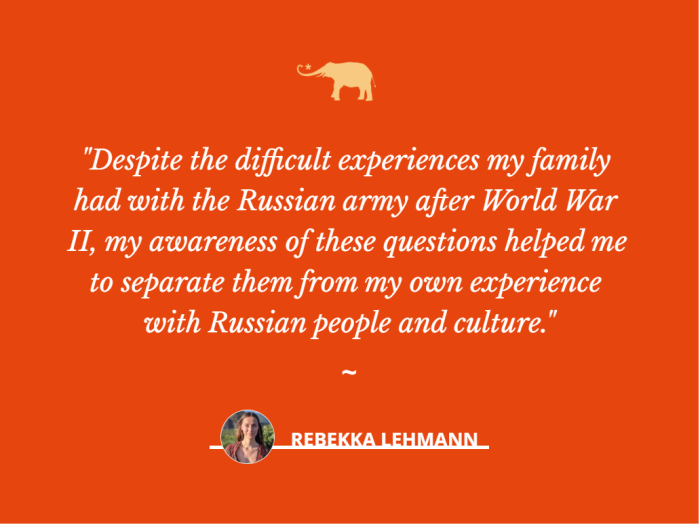View this post on Instagram
*Author’s Note: Trigger warning: This article includes stories of war-related flights.
~
Last Sunday, my nervous system was flooded by the news.
For a couple of days, I had rushed from one task to the next and did what I could for the people in Ukraine.
I collected and bought things to donate that my Georgian neighbors were going to take to the Ukrainian border, spread the news to my neighbors to do the same, and went to a protest.
And then, I finally sat down. I sat down to notice how I felt.
And I realized that I was triggered. The current situation in Europe had put me in a state of anxiety and panic that felt overwhelming.
But what I felt didn’t only feel like my own, perhaps valid fear of the current events.
I also felt the stories and emotions my ancestors had passed down to me reverberate in myself.
My paternal ancestors were barely teenagers when, after World War II, the Russian army invaded their village. Like many others, they were a German minority in Hungary and were sent to Germany in a process of deportation.
Countless times, my grandaunt told me how they had only 30 minutes to pack up whatever they could carry to leave their home, forced on trains, not knowing where they’d go or if they’d ever return.
My maternal ancestors also had to flee after World War II, as they lived in an area that used to belong to Germany (now Poland).
One of the stories that was shared with me during my upbringing was how my grandmother’s aunt and mother refused to leave their home because they hadn’t done anything to the Russian army, so they shot them in front of my grandmother.
As someone who is trained in trauma counseling, I’m aware of the concept of generational trauma.
While this concept is quite new and there’s still a lot to learn, we speak of generational trauma when trauma is not only experienced by one person, but is passed down from one generation to the next.
Generational trauma was first recognized in children of holocaust survivors, who were overrepresented in psychiatric care referrals.
It may present itself as anxiety, stress, or heightened alert systems in the body, but can also appear in more subtle ways through learned patterns, behaviors, and beliefs.
If you feel triggered by the current events and flooded by emotions, either in Europe or in your own country, here’s what you can do:
In the very moment of feeling a strong emotion like anxiety or panic arise, try to focus on the present moment.
Notice and name what you see in your surroundings. Observe what you hear, too. Notice any sensations on your skin, and name what you can smell or taste.
Take a few deep breaths all the way into your belly, and exhale completely.
If it feels right, move your body and massage your hands or feet. Have a sip of a cold water or a warm drink, and open the window to let fresh oxygen in.
Remind yourself that in this moment, you are safe.
This last one was a big help for me personally.
I barely use my mala to meditate, but last Sunday, it felt right. It took five rounds around the mala, repeating this affirmation on each bead: in this moment, I am safe.
It took me five rounds until my tears were dried and my breath slowed down. Five rounds until I started to notice the sensation of the cold beads in my hand, and until my mind focused only on the words instead of my fears.
In this moment, I am safe.
Whatever strategy you choose, find out what works for you in that specific moment by asking yourself: what would help me feel more grounded right now?
Perhaps you need to be disconnected from news channels for a day, connect with nature or a loved one, or simply rest and distract yourself. That’s okay.
You’ll come back to the current events when you’re ready.
Once you feel like you’ve returned to the present moment, and some time has passed, you may inquire if the reaction you felt is partially driven by generational trauma.
Here are some questions you can ask yourself once you feel grounded:
1. Does this emotion feel like it’s only mine, or someone else’s, too?
2. When I look back at my family history, are there any parallels to what’s happening in the world right now?
3. If so, were my ancestors the oppressed or the oppressors?
4. How have the stories of their experiences shaped my upbringing and how I relate to this world (and the specific situation we’re living in right now)?
5. Is this heritage something I want to keep carrying, or would I like to let go of it?
Journal about these questions, or talk to a trusted friend or family member about them.
If you need to, and it’s possible, ask your family members about any stories you heard bits and pieces about during your childhood, but that doesn’t make sense to you yet.
While my personal experience centers around the current events in Europe, these questions can, of course, be relevant in other contexts and conflicts, too.
And even if your family history isn’t closely connected to what’s triggering you, be curious and explore if and how these questions can work for you.
Creating awareness around these topics can help us make sense of our emotional world and stay centered in times when the outer world is changing by the minute.
But apart from that, it can also help us differentiate. What we experience now are the results of politics, a lack of communication, and an inability to find common ground.
Despite the difficult experiences my family had with the Russian army after World War II, my awareness of these questions helped me to separate them from my own experience with Russian people and culture.
Being conscious of our own history can help us do that, as there’s no need to judge a country’s people by the actions of their dictator.
Starting with creating awareness in ourselves can be this first step toward finding a common ground.
May these ideas and questions be of benefit to you and everyone around you.
Sending you lots of ease and presence during these times.











Read 14 comments and reply